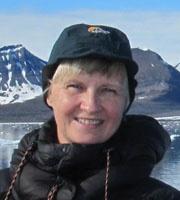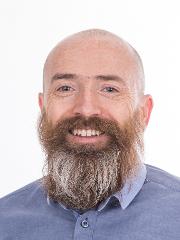Gass og gasshydrater
Photo: mostphotos.com
Karin Marie Andreassen
Professor, CAGE direktør
Unit: Department of Geosciences
My research covers different aspects of marine geology and geophysics. I have for several years been involved in geophysical investigations of natural gas hydrates in arctic areas, focusing on identification, quantification and characterization of hydrates and associated free gas accumulations. My current research projects relates mainly to Cenozoic development of the Barents Sea area. I have used a wide range of methods in my research and have expertise in geophysical processing, modelling, interpretation of mainly P-wave but also S-wave seismic data. The last few years I have focused my research efforts on glacial geomorphology, sediments and processes. This includes research on identifying ice streams of the former Barents Sea - northern Fennoscandian Ice Sheets and reconstructing their behaviour through the Pleistocene. The use of three-dimensional (3D) seismic has been important in this work, and I have, together with a colleague, been responsible for establishing a geophysical laboratory in interpretation and visualization of 3D seismic data at UiT.

Yngve Birkelund
Professor / Fornybar energi
Unit: Department of Physics and Technology
Fornybar energi, vindressurser, prediksjon av vindkraft, tidsrekkeanalyse, maskinlæring, statistisk signalteori, ikke-lineære systemer, høyere ordens statistikk, mikrobølger, ultralys og hypertermi
Høst 2025-Vår 2026: Forskningstermin ved National Center for Atmospheric Research (NCAR), Boulder, Colorado
Forskningsprosjekter:
- Smart Senja: https://smartsenja.no
- nICE: https://en.uit.no/project/nice
Veiledning av PhD studenter:
- Martin Hansen Skjelvareid (2012): Synthetic aperture ultrasound imaging with application to interior pipe inspection
- Øystein Klemetsen (2012): Design and evaluation of a medical microwave radiometer for observing temperature gradients subcutaneously in the human body
- Thomas Beka (2016): Geoelectrical structures beneath Spitsbergen-Svalbard derived from magnetotelluric imaging
- Muhammad Bilal (2016): Wind Energy at Nygårdsfjellet – Norway. Wind field characterization and modelling
- Jia Yi Yin (2021): Study of Atmospheric Ice Accretion on Wind Turbine Blades (medveileder)
- Hao Chen (2022): Data-driven Arctic wind energy analysis by statistical and machine learning approaches
- Albara Mustafa (2023): Risk and Resilience Assessment of Wind Farms Performance in Cold Climate Regions (medveileder)
- Kine Solbakken (ongoing) - Numerical wind modelling in complex terrain
- Pravin Punde (ongoing) - Numerical weather prediction modelling and ice accretion on structures

Stefan Bünz
Professor in Marine Geophysics
Unit: Department of Geosciences
Research interests:
Stefan has a strong background in marine geology and geophysics, specializing in areas such as fluid flow, gas hydrate systems, marine geohazards, oceanic heat flow, CO2-storage, and seafloor ecosystems. Stefan is proficient in a range of analytical and numerical techniques, including seismic imaging and other geophysical analysis. He is committed to advancing our understanding of the Earth’s oceanic systems, particularly on all aspects of gas hydrate and fluid flow in marine sediments and their role in storing and remobilizing carbon with implications for climate and seafloor ecosystems.
Stefan holds a PhD degree in marine geology and geophysics from UiT The Arctic University of Norway. He has been a professor at the Department of Geology at UiT since 2007. His research contributions are documented in over 80 peer-reviewed publications.